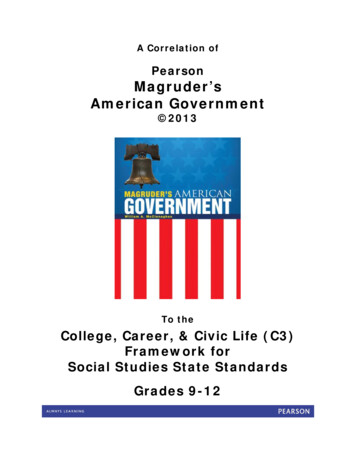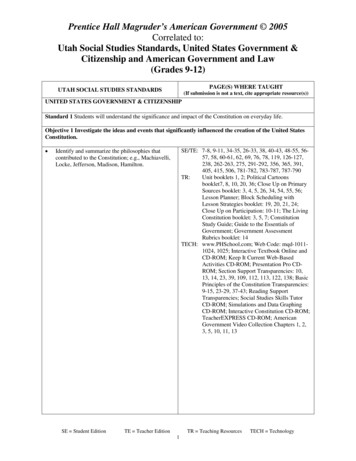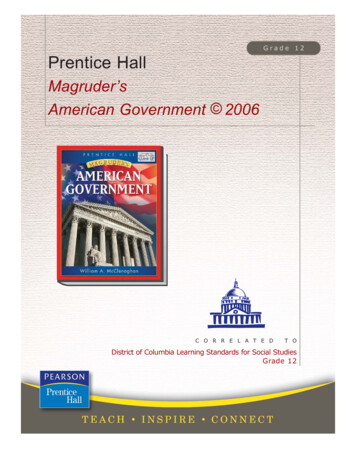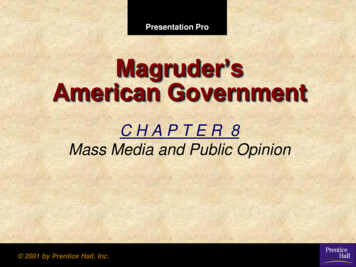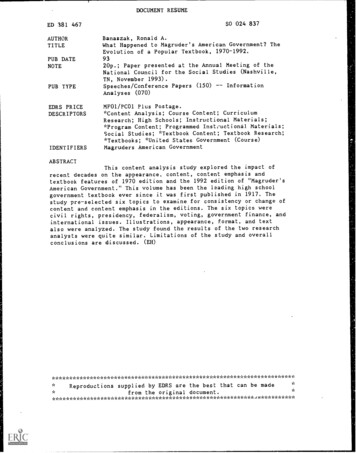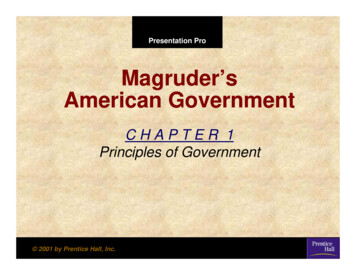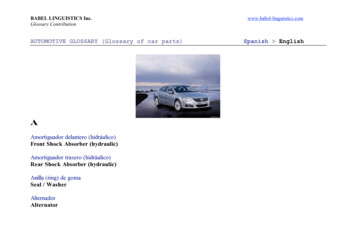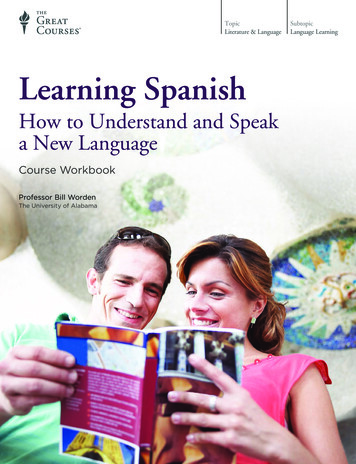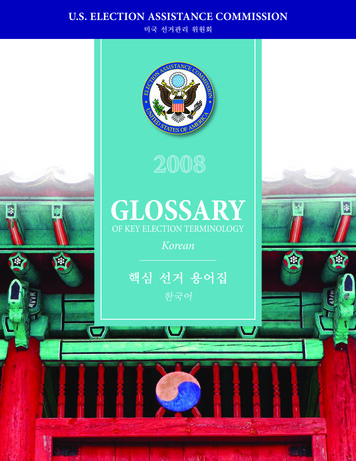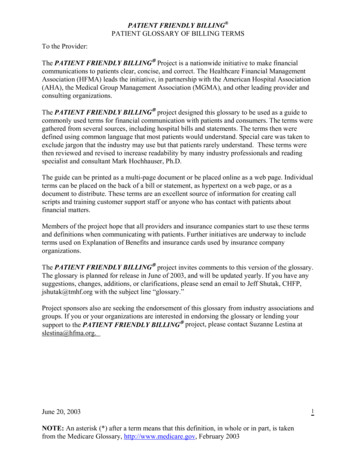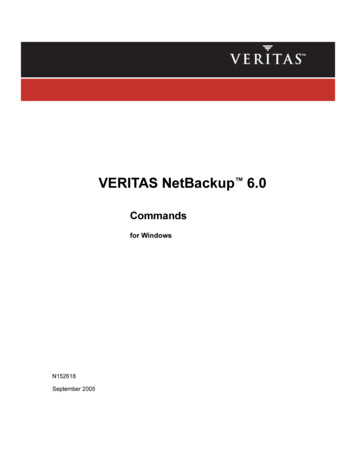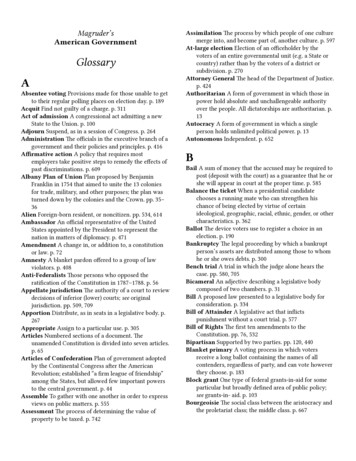
Transcription
Magruder’sAmerican fiThThThThThThThttThfiffiAbsentee voting Provisions made for those unable to getto their regular polling places on election day. p. 189Acquit Find not guilty of a charge. p. 311Act of admission A congressional act admi ing a newState to the Union. p. 100Adjourn Suspend, as in a session of Congress. p. 264Administration e o cials in the executive branch of agovernment and their policies and principles. p. 416A rmative action A policy that requires mostemployers take positive steps to remedy the e ects ofpast discriminations. p. 609Albany Plan of Union Plan proposed by BenjaminFranklin in 1754 that aimed to unite the 13 coloniesfor trade, military, and other purposes; the plan wasturned down by the colonies and the Crown. pp. 35–36Alien Foreign-born resident, or noncitizen. pp. 534, 614Ambassador An o cial representative of the UnitedStates appointed by the President to represent thenation in ma ers of diplomacy. p. 471Amendment A change in, or addition to, a constitutionor law. p. 72Amnesty A blanket pardon o ered to a group of lawviolators. p. 408Anti-Federalists ose persons who opposed therati cation of the Constitution in 1787–1788. p. 56Appellate jurisdiction e authority of a court to reviewdecisions of inferior (lower) courts; see originaljurisdiction. pp. 509, 709Apportion Distribute, as in seats in a legislative body. p.267Appropriate Assign to a particular use. p. 305Articles Numbered sections of a document. eunamended Constitution is divided into seven articles.p. 65Articles of Confederation Plan of government adoptedby the Continental Congress a er the AmericanRevolution; established “a rm league of friendship”among the States, but allowed few important powersto the central government. p. 44Assemble To gather with one another in order to expressviews on public ma ers. p. 555Assessment e process of determining the value ofproperty to be taxed. p. 742Assimilation e process by which people of one culturemerge into, and become part of, another culture. p. 597At-large election Election of an o ceholder by thevoters of an entire governmental unit (e.g. a State orcountry) rather than by the voters of a district orsubdivision. p. 270Attorney General e head of the Department of Justice.p. 424Authoritarian A form of government in which those inpower hold absolute and unchallengeable authorityover the people. All dictatorships are authoritarian. p.13Autocracy A form of government in which a singleperson holds unlimited political power. p. 13Autonomous Independent. p. 652BBail A sum of money that the accused may be required topost (deposit with the court) as a guarantee that he orshe will appear in court at the proper time. p. 585Balance the ticket When a presidential candidatechooses a running mate who can strengthen hischance of being elected by virtue of certainideological, geographic, racial, ethnic, gender, or othercharacteristics. p. 362Ballot e device voters use to register a choice in anelection. p. 190Bankruptcy e legal proceeding by which a bankruptperson’s assets are distributed among those to whomhe or she owes debts. p. 300Bench trial A trial in which the judge alone hears thecase. pp. 580, 705Bicameral An adjective describing a legislative bodycomposed of two chambers. p. 31Bill A proposed law presented to a legislative body forconsideration. p. 334Bill of Attainder A legislative act that in ictspunishment without a court trial. p. 577Bill of Rights e rst ten amendments to theConstitution. pp. 76, 532Bipartisan Supported by two parties. pp. 120, 440Blanket primary A voting process in which votersreceive a long ballot containing the names of allcontenders, regardless of party, and can vote howeverthey choose. p. 183Block grant One type of federal grants-in-aid for someparticular but broadly de ned area of public policy;see grants-in- aid. p. 103Bourgeoisie e social class between the aristocracy andthe proletariat class; the middle class. p. 667
Boycott Refusal to buy or sell certain products orservices. p. 36Budget A nancial plan for the use of money, personnel,and property. p. 744Bureaucracy A large, complex administrative structurethat handles the everyday business of an organization.p. 414Bureaucrat A person who works for a bureaucraticorganization; see bureaucracy. p. 415By-election A special election held to choose areplacement for a member of parliament, in the eventof a death. p. fiCabinet Presidential advisory body, traditionally made upof the heads of the executive departments and othero cers. p. 81Capital All the human-made resources that are used toproduce goods and services. p. 659Capitalist Someone who owns capital and puts it toproductive use; o en applied to people who own largebusinesses. p. 659Capital punishment e death penalty. p. 587Categorical grant One type of federal grants-in-aid;made for some speci c, closely de ned, purpose; seegrants-in-aid. p. 102Caucus As a nominating device, a group of like-mindedpeople who meet to select the candidates they willsupport in an upcoming election. p. 180Censure Issue a formal condemnation. p. 312Centrally planned economy A system in whichgovernment bureaucrats plan how an economy willdevelop over a period of years. p. 669Certi cate A method of pu ing a case before theSupreme Court; used when a lower court is not clearabout the procedure or rule of law that should applyin a case and asks the Supreme Court to certify theanswer to a speci c question. p. 521Charter A city’s basic law, its constitution; a wri engrant of authority from the king. pp. 31, 726Checks and balances System of overlapping the powersof the legislative, executive, and judicial branches topermit each branch to check the actions of the others;see separation of powers. p. 67Chief administrator Term for the President as head ofthe administration of the Federal Government. p. 355Chief citizen Term for the President as the representativeof the people, working for the public interest. p. 355Chief diplomat Term for the President as the mainarchitect of foreign policy and spokesperson to othercountries. p. 355Chief executive Term for the President as vested withthe executive power of the United States. p. 354Chief legislator Term for the President as architect ofpublic policy and the one who sets the agenda forCongress. p. 355Chief of party Term for the President as the leader of hisor her political party. p. 355Chief of state Term for the President as the ceremonialhead of the United States, the symbol of all the peopleof the nation. p. 354Citizen A member of a state or nation who owesallegiance to it by birth or naturalization and isentitled to full civil rights. p. 613Civil case A case involving a noncriminal ma er such asa contract dispute or a claim of patent infringement. p.513Civil law e portion of the law relating to humanconduct, to disputes between private parties, and todisputes between private parties and government notcovered by criminal law. p. 704Civil liberties e guarantees of the safety of persons,opinions, and property from the arbitrary acts ofgovernment, including freedom of speech andfreedom of religion. p. 533Civil rights A term used for those positive acts ofgovernment that seek to make constitutionalguarantees a reality for all people, e.g., prohibitions ofdiscrimination. p. 533Civil service ose civilian employees who perform theadministrative work of government. p. 437Civilian tribunal A court operating as part of the judicialbranch, entirely separate from the militaryestablishment. p. 525Clemency Mercy or leniency granted to an o ender by achief executive; see pardon and reprieve. pp. 407, 699Closed primary A party nominating election in whichonly declared party members can vote. p. 182Cloture Procedure that may be used to limit or end oordebate in a legislative body. p. 344Coalition A temporary alliance of several groups whocome together to form a working majority and so tocontrol a government. pp. 122, 628Coattail e ect e e ect of a strong candidate runningfor an o ce at the top of a ballot helping to a ractvoters to other candidates on the party’s ticket. p. 190Cold war A period of more than 40 years during whichrelations between the two superpowers were at leasttense, and o en hostile. A time of threats and militarybuild up. p. 485Collective security e keeping of international peaceand order. p. 485
ization Collective or state ownership of themeans of production. p. 674Commander in chief Term for the President ascommander of the nation’s armed forces. p. 355Commerce and Slave Trade Compromise Anagreement during the Constitutional Conventionprotecting slave holders; denied Congress the powerto tax the export of goods from any State, and, for 20years, the power to act on the slave trade. p. 53Commerce power Exclusive power of Congress toregulate interstate and foreign trade. p. 297Commission government A government formed bycommissioners, heads of di erent departments of citygovernment, who are popularly elected to form thecity council and thus center both legislative andexecutive powers in one body. p. 728Committee chairman Member who heads a standingcommi ee in a legislative body. p. 325Committee of the Whole A commi ee that consists ofan entire legislative body; used for a procedure inwhich a legislative body expedites its business byresolving itself into a commi ee of itself. p. 339Common law An unwri en law made by a judge that hasdeveloped over centuries from those generallyaccepted ideas of right and wrong that have gainedjudicial recognition. p. 702Commune A large grouping of several collective farms. p.675Communism An ideology which calls for the collective,or state, ownership of land and other productiveproperty. p. 672Commutation e power to reduce (commute) the lengthof a sentence or ne for a crime. pp. 408, 699Compromise An adjustment of opposing principles orsystems by modifying some aspect of each. p. 20Concurrent jurisdiction Power shared by federal andState courts to hear certain cases. p. 508Concurrent powers ose powers that both the NationalGovernment and the States possess and exercise. p. 93Concurrent resolution A statement of position on anissue used by the House and Senate acting jointly;does not have the force of law and does not requirethe President’s signature. p. 335Concurring opinion Wri en explanation of the views ofone or more judges who support a decision reached bya majority of the court, but wish to add or emphasizea point that was not made in the majority decision. p.522Confederation A joining of several groups for a commonpurpose. pp. 15, 35Conference committee Temporary joint commi eecreated to reconcile any di erences between the twohouses’ versions of a bill. p. 333Connecticut Compromise Agreement during theConstitutional Convention that Congress should becomposed of a Senate, in which States would berepresented equally, and a House, in whichrepresentation would be based on a State’s population.p. 52Consensus General agreement among various groups onfundamental ma ers; broad agreement on publicquestions. pp. 121, 292, 636Constituency e people and interests that an electedo cial represents. p. 277Constituent power e non-legislative power ofConstitution- making and the constitutionalamendment process. p. 692Constitution e body of fundamental laws se ing outthe principles, structures, and processes of agovernment. p. 4Constitutionalism Basic principle that government andthose who govern must obey the law; the rule of law;see limited government. p. 65Containment A policy based in the belief that ifcommunism could be kept within its existingboundaries, it would collapse under the weight of itsinternal weaknesses. p. 486Content neutral e government may not regulateassemblies on the basis on what might be said. p. 556Continuing resolution A measure which allowsagencies to continue working based on the previousyear’s appropriations. p. 462Continuous body Governing unit (e.g. the United StatesSenate) whose seats are never all up for election at thesame time. p. 277Controllable spending An amount decided upon byCongress and the President to determine how muchwill be spent each year on many individualgovernment expenditures, including environmentprotection programs, aid to education, and so on. p.459Copyright e exclusive, legal right of a person toreproduce, publish, and sell his or her own literary,musical, or artistic creations. p. 302Council-manager government A modi cation of themayor- council government, it consists of a strongcouncil of members elected on a non-partisan ballot, aweak mayor, elected by the people, and a manager,named by the council; see mayor-council government;see also weak mayor government. p. 728County A major unit of local government in most States.p. 718
Court-martial A court composed of military personnel,for the trial of those accused of violating military law.p. 525Criminal case A case in which a defendant is tried forcommi ing a crime as de ned by the law. p. 513Criminal law e portion of the law that de nes publicwrongs and provides for their punishment. p. 704Cultural Revolution Begun in 1966, Mao Tse Tung’s RedGuards a acked, bullied, and “reeducated” teachers,intellectuals, and anyone else who seemed to lackrevolutionary fervor. p. 650Custom duty A tax laid on goods brought into the UnitedStates from abroad, also known as tari s, importduties, or imposts. p. ttfiftfifittDe facto segregation Segregation even if no law requiresit, e.g., housing pa erns. p. 604De jure segregation Segregation by law, with legalsanction. p. 604Defendant In a civil suit, the person against whom acourt action is brought by the plainti ; in a criminalcase, the person charged with the crime. p. 509De cit e yearly shortfall between revenue andspending. p. 455De cit nancing Practice of funding government byborrowing to make up the di erence betweengovernment spending and revenue. p. 296Delegated powers ose powers, expressed, implied, orinherent, granted to the National Government by theConstitution. p. 89Democracy A form of government in which the supremeauthority rests with the people. p. 5Denaturalization e process through which naturalizedcitizens may involuntarily lose their citizenship. p. 615Deportation A legal process in which aliens are legallyrequired to leave the United States. p. 617Détente A relaxation of tensions. p. 488Deterrence e policy of making America and its allies somilitarily strong that their very strength willdiscourage, or prevent, any a ack. p. 485Devolution e delegation of authority from the centralgovernment to regional governments. p. 631Dictatorship A form of government in which the leaderhas absolute power and authority. p. 5Diplomatic immunity When an ambassador is notsubject to the laws of the state to which they areaccredited. p. 471Direct popular election Proposal to do away with theelectoral college and allow the people to vote directlyfor President and Vice President. p. 383Direct primary An election held within a party to pickthat party’s candidates for the general election. p. 182Direct tax A tax that must be paid by the person onwhom it is levied; see indirect tax. p. 296Discharge petition A procedure enabling members toforce a bill that has been pigeonholed in commi eeonto the oor for consideration. p. 336Discrimination Bias, unfairness. p. 570Dissenting opinion Wri en explanation of the views ofone or more judges who disagree with (dissent from) adecision reached by a majority of the court; seemajority opinion. p. 522Dissolution e power of the Prime Minister to dissolvethe House of Representatives. p. 636District plan Proposal for choosing presidential electorsby which two electors would be selected in each Stateaccording to the Statewide popular vote and the otherelectors would be selected separately in each of theState’s congressional districts. p. 382Division of powers Basic principle of federalism; theconstitutional provisions by which governmentalpowers are divided on a geographic basis (in theUnited States, between the National Government andthe States). pp. 14, 89Docket A court’s list of cases to be heard. p. 513Doctrine Principle or fundamental policy. p. 308Domestic a airs All ma ers not directly connected tothe realm of foreign a airs. pp. 422, 468Double jeopardy Part of the 5th Amendment which saysthat no person can be put in jeopardy of life or limbtwice. Once a person has been tried for a crime, he orshe cannot be tried again for the same crime. p. 578Dra Conscription, or compulsory military service. p. 480Due process e government must act fairly and inaccord with established rules in all that it does. p. 564Due Process Clause Part of the 14th Amendment whichguarantees that no state deny basic rights to itspeople. p. 535EEconomic protest parties Parties rooted in pooreconomic times, lacking a clear ideological base,dissatis ed with current conditions and demandingbe er times. p. 133Electoral college Group of persons chosen in each Stateand the District of Columbia every four years whomake a formal selection of the President and VicePresident. pp. 81, 366Electoral votes Votes cast by electors in the electoralcollege. p. 365
iElectorate All of the people entitled to vote in a givenelection. pp. 129, 148, 383Eminent domain Power of a government to take privateproperty for public use. p. 304Enabling act A congressional act directing the people ofa United States territory to frame a proposed Stateconstitution as a step towards admission to the Union.p. 99English Bill of Rights Document wri en by Parliamentand agreed on by William and Mary of England in1689, designed to prevent abuse of power by Englishmonarchs; forms the basis for much in Americangovernment and politics today. p. 30Engross To print a bill in its nal form. p. 340Entitlement A bene t that federal law says must be paidto all those who meet the eligibility requirements, e.g.,Medicare, food stamps, and veterans’ pension. pp. 458,735Entrepreneur An individual with the drive and ambitionto combine land, labor, and capital resources toproduce goods or o er services. p. 659Espionage Spying. p. 477Establishment Clause Separates church and state. p. 537Estate tax A levy imposed on the assets of one who dies.pp. 451, 742Ex post facto law A law applied to an act commi edbefore its passage. p. 577Excise tax A tax laid on the manufacture, sale, orconsumption of goods and/or the performance ofservices. p. 451Exclusionary rule Evidence gained as the result of anillegal act by police cannot be used against the personfrom whom it was seized. p. 573Exclusive jurisdiction Power of the federal courts aloneto hear certain cases. p. 508Exclusive powers ose powers that can be exercised bythe National Government alone. p. 93Executive agreement A pact made by the Presidentdirectly with the head of a foreign state; a bindinginternational agreement with the force of law butwhich (unlike a treaty) does not require Senateconsent. pp. 80, 400Executive Article Article II of the Constitution.Establishes the presidency and gives the executivepower of the Federal Government to the President. p.390Executive departments O en called the Cabinetdepartments, they are the traditional units of federaladministration. p. 424Executive O ce of the President An organization ofseveral agencies sta ed by the President’s closestadvisors. p. 419 Executive order Directive, rule, orregulation issued by a chief executive or subordinates,based upon constitutional or statutory authority andhaving the force of law. p. 394Executive power e power to execute, enforce, andadminister law. p. 4Expatriation e legal process by which a loss ofcitizenship occurs. p. 614Expressed powers ose delegated powers of theNational Government that are spelled out, expressly,in the Constitution; also called the “enumeratedpowers.” pp. 89, 290Extradition e legal process by which a fugitive fromjustice in one State is returned to that State. p. 107FFaction A con icting group. p. 127Factors of production Basic resources which are used tomake all goods and services. p. 658Federal budget A detailed nancial document containingestimates of federal income and spending during thecoming scal year. p. 421Federal government A form of government in whichpowers are divided between a central government andseveral local governments. p. 14Federalism A system of government in which a wri enconstitution divides power between a central, ornational, government and several regionalgovernments. pp. 70, 88Federalists ose persons who supported the rati cationof the Constitution in 1787–1788. p. 56Felony A serious crime which may be punished by aheavy ne and/or imprisonment or even death. p. 704Filibuster Various tactics (usually long speeches) aimedat defeating a bill in a legislative body by preventing anal vote; associated with the U.S. Senate; see cloture.p. 343Fiscal year e 12-month period used by a governmentand the business world for its record-keeping,budgeting, revenue- collecting, and other nancialmanagement purposes. p. 421Five-year plan A plan which projects economicdevelopment over the next ve years. p. 673Floor leaders Members of the House and Senate pickedby their parties to carry out party decisions and steerlegislative action to meet party goals. p. 324Foreign a airs A nation’s relationships with othercountries. p. 468Foreign aid Economic and military aid to other countries.p. 491
Foreign policy A group of policies made up of all thestands and actions that a nation takes in every aspectof its relationships with other countries; everything anation’s government says and does in world a airs. p.469Formal amendment Change or addition that becomespart of the wri en language of the Constitution itselfthrough one of four methods set forth in theConstitution. p. 73Framers Group of delegates who dra ed the United StatesConstitution at the Philadelphia Convention in 1787.p. 48Franchise e right to vote. p. 148Franking privilege Bene t allowing members ofCongress to mail le ers and other materials postagefree. p. 283Free enterprise system An economic systemcharacterized by private or corporate ownership ofcapital goods; investments that are determined byprivate decision rather than by state control, anddetermined in a free market. pp. 20, 659Free Exercise Clause e second part of theconstitutional guarantee of religious freedom, whichguarantees to each per- son the right to believewhatever he or she chooses to believe in ma ers ofreligion. p. 542Full Faith and Credit Clause Constitution’srequirement that each State accept the public acts,records, and judicial proceedings of every other State.p. 106Fundamental law Laws of basic and lasting importancewhich may not easily be changed. p. ttThThThThThttftThttftGender gap Measurable di erences between the partisanchoices of men and women today. p. 169General election e regularly scheduled election atwhich voters make a nal selection of o ceholders. p.179Gerrymandering e drawing of electoral district linesto the advantage of a party or group. pp. 159, 271Gi tax A tax on a gi by a living person. p. 451Glasnost e Soviet policy of openness under whichtolerance of dissent and freedom of expressionincreased. p. 646Gosplan A large agency in the Soviet Union, introducedby Stalin, to run centralized planning. p. 674Government e institution through which a societymakes and enforces its public policies. p. 4Government corporation Corporations within theexecutive branch subject to the President’s directionand control, set up by Congress to carry out certainbusiness-like activities. p. 434Grand jury e formal device by which a person can beaccused of a serious crime. p. 577Grants-in-aid program Grants of federal money or otherresources to States, cities, counties, and other localunits. p. 101Grass roots Of or from the people, the average voters. p.253Great Leap Forward e ve-year plan for 1958 whichwas an a empt to quickly modernize China. p. 675HHard money Campaign money that is subject toregulations by the FEC. p. 202Heterogeneous Of another or di erent race, family orkind; composed of a mix of elements. p. 594IIdeological parties Parties based on a particular set ofbeliefs, a comprehensive view of social, economic, andpolitical ma ers. p. 132Immigrant ose people legally admi ed as permanentresidents of a country. p. 594Impeach To bring formal charges against a public o cial;the House of Representatives has the sole power toimpeach civil o cers of the United States. p. 311Imperial presidency Term used to describe a Presidentas an “emperor” who acts without consultingCongress or acts in secrecy to evade or deceiveCongress; o en used in reference to Richard Nixon’spresidency. p. 392Implied powers ose delegated powers of the NationalGovernment that are suggested by the expressedpowers set out in the Constitution; those “necessaryand proper” to carry out the expressed powers; seedelegated powers, expressed powers. pp. 90, 290Income tax A tax levied on the income of individualsand/or corporations. p. 741Incorporation e process by which a State establishes acity as a legal body. p. 726Incumbent e current o ceholder. p. 127Independent agencies Additional agencies created byCongress located outside the Cabinet departments. p.430Independent executive agencies Agencies headed by asingle administrator with regional subunits, butlacking Cabinet status. p. 431
Independent regulatory commissions Independentagencies created by Congress, designed to regulateimportant aspects of the nation’s economy, largelybeyond the reach of presidential control. p. 431Independents A term used to describe people who haveno party a liation. p. 171Indictment A formal complaint before a grand jurywhich charges the accused with one or more crimes.p. 578Indirect tax A tax levied on one party but passed on toanother for payment. p. 296Inferior courts e lower federal courts, beneath theSupreme Court. p. 507Information A formal charge led by a prosecutorwithout the action of a grand jury. p. 704Inherent powers Powers the Constitution is presumed tohave delegated to the National Government because itis the government of a sovereign state within theworld community. pp. 91, 290Inheritance tax A tax levied on the bene ciary’s share ofan estate. p. 742Initiative A process in which a certain number ofquali ed voters sign petitions in favor of a proposedstatute or constitutional amendment, which then goesdirectly to the ballot. p. 687Injunction A court order that forces or limits theperformance of some act by a private individual or bya public o cial. p. 161Integration e process of bringing a group into equalmembership in society. p. 603Interest A charge for borrowed money, generally apercentage of the amount borrowed. p. 454Interest group Private organizations whose membersshare certain views and work to shape public policy. p.216Interstate compact Formal agreement entered into withthe consent of Congress, between or among States, orbetween a State and a foreign state. p. 105Involuntary servitude Forced labor. p. 569Isolationism A purposeful refusal to become generallyinvolved in the a airs of the rest of the world. p. 468Item veto A governor may veto one or more items in abill without rejecting the entire measure. p. 699JfifittttfittThThffThThThThThffiffiThfiJim Crow law A law that separates people on the basis ofrace, aimed primarily at African Americans. p. 602Joint committee Legislative commi ee composed ofmembers of both houses. p. 333Joint resolution A proposal for action that has the forceof law when passed; usually deals with specialcircumstances or temporary ma ers. p. 335Judicial power e power to interpret laws, to determinetheir meaning, and to se le disputes within thesociety. p. 4Judicial review e power of a court to determine theconstitutionality of a governmental action. p. 69Jurisdiction e authority of a court to hear a case. p. 508Jury A body of persons selected according to law whohear evidence and decide questions of fact in a courtcase. p. 704Jus sanguinis e law of blood, which determinescitizenship based on one’s parents’ citizenship. p. 613Jus soli e law of soil, which determines citizenshipbased on where a person is born. p. 613Justice of the Peace A judge who stands on the lowestlevel of the State judicial system and presides overjustice courts. p. 707KKeynote address Speech given at a party convention toset the tone for the convention and the campaign tocome. p. 373LLabor union An organization of workers who share thesame type of job, or who work in the same industry,and press for government policies that will bene ttheir members. p. 244Laissez-faire theory A theory which suggests thatgovernment should play a very limited role in society.p. 662Law of supply and demand A law which states thatwhen sup- plies of goods and services becomeplentiful, prices tend to drop. When supplies becomescarcer, prices tend to rise. pp. 21, 661Legal tender Any kind of money that a creditor must, bylaw, accept in payment for debts. p. 299Legislative power e power to make a law and to framepub- lic policies. p. 4Libel False and malicious use of printed words. p. 546Liberal constructionist One who argues a broadinterpretation of the provisions of the Constitution,particularly those grant- ing powers to the FederalGovernment. p. 291Limited government Basic principle of Americangovernment which states that government is restrictedin what it may do, and each individual has rights thatgovernment cannot take away; see constitutionalism,popular sovereignty. pp. 29, 685
Line agency An agency which performs the tasks forwhich the organization exists. p. 418Line-item veto A President’s cancellation of speci cdollar amounts (line items) from a congressionalspending bill; instituted by a 1
Magruder's American Government Glossary A Absentee voting Provisions made for those unable to get to their regular polling places on election day. p. 189 Acquit Find not guilty of a charge. p. 311 Act of admission A congressional act admi!ing a new State to the Union. p. 100 Adjourn Suspend, as in a session of Congress. p. 264
